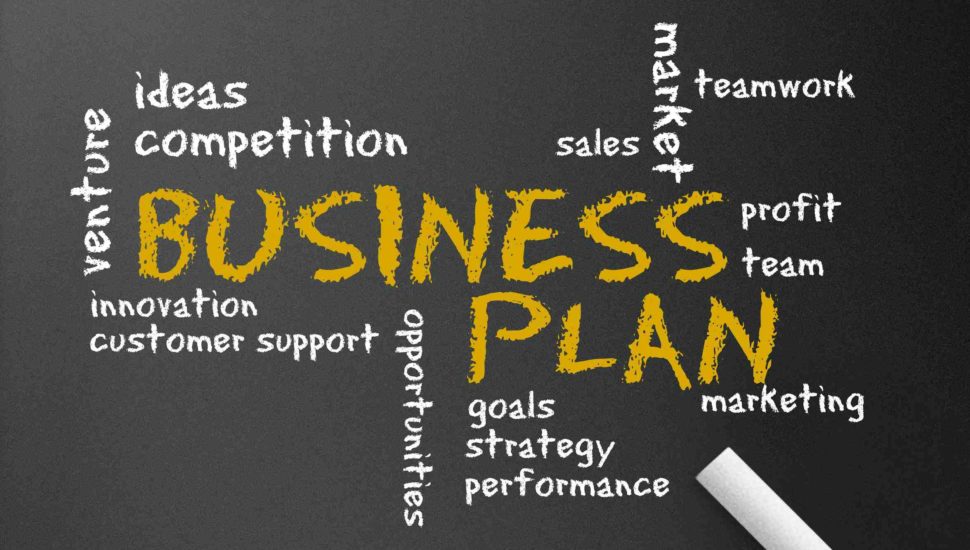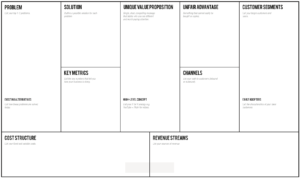SCORE: Lean/Business Model Canvas Lets You Map Out Your Business Plan on a Single Page

The Business Canvas gives entrepreneurs a broad view of their path to success on a single page like a painting on a canvas brings an image to life with color, contrast, dimension. ![]()
Launching a small business has always been a hit-or-miss experience. Conventional wisdom required owners to write a detailed business plan, pitch it to investors, pull together a team, introduce their product or service into the market, and then sell like crazy.
Most startups experience severe or fatal setbacks early in the process. Fighting the odds of success in a competitive marketplace can become a full-time distraction.
‘Startups are not smaller versions of large companies. They do not unfold in accordance with master plans.” Steve Blank, HBR Why the Lean Startup Changes Everything. 2013
Thanks to the evolution of the ‘lean startup’ methodology and the Business Model Canvas over the last 10 years, we have the Lean Canvas, a simple one-page planning tool that allows an entrepreneur to plan out and test nine building blocks of a business concept.
A review of all the start-up tools out there finds this mapping exercise to be one of the most well-known and relied-upon to help entrepreneurs transform an idea into an organized strategy and actionable business plan.
The goal is clear: increase your chance of success by failing fast, pivoting, and continue learning.
The Lean Canvas focuses on identifying customer problems worth solving. This approach favors experimentation over complex planning, customer feedback over intuition, and steadily improving design – through iteration – of a product or service over expensive development upfront.

Attend SCORE’s upcoming webinar Oct. 8 at 10 a.m. with John Hess – Leanstack Canvas: Business Plan on a Page. You can register here:
Entrepreneurs can take risk early to test ‘minimal viable products’ (MVP) or services with potential users. MVP provides enough features to attract early-adopter clients to validate concepts.
By learning in the marketplace directly, owners gather data about customer behavior, competitive response, and perceived value. The analysis helps to inform new choices, better options, and permission to ‘pivot’ with an endgame to deliver the most value for the customers and the company.
The tool itself is a single page with nine building blocks for mapping the plan. The exercise forces owners to remain focused and be concise as they evaluate strategy, planning gaps, and exposure to risk.
Startups can create multiple canvases to experiment with different product ideas and business models.
John Hess, SCORE chairman and mentor, uses this planning tool with many clients.
“I believe the Lean Canvas is more powerful for a startup. It is oriented around solving a problem for a specific customer segment. Compared to traditional planning approaches, this tool helps entrepreneurs to avoid wasting time and money building the wrong product or solution,” Hess says.
Whether you are a new business owner crafting a business plan for the first time or an owner looking to grow or pivot a current business, going through the exercise can be even more valuable with a SCORE mentor by your side.
“Because the Canvas is one page, it lends itself to getting critical ideas from the brain to the map quickly,” Hess says. “It is intuitive. An experienced mentor can help probe and ask questions, while the entrepreneur uses market data to get at the answers.”
Both the Business Model Canvas and Lean Canvas options share these building blocks.
Value Proposition, at the center of the map, is a clear statement of the benefit your products or services offer and to what degree your solution is advantaged over other options.
Customer Segments are the people who pay you for the value of your unique solution. Which customer segments are in your target and which are most critical for your business’ success?
Sales Channels are all the selling methods you use to deliver your products or services to your customers. There are many options. Which methods will be most cost-effective?
Cost Structure includes all the expenses to operate your business: fixed and variable, startup and ongoing. Which costs drive value in your offerings? When will revenue deliver a profit?
Revenue Stream is all the sources of payment you collect for your product or service. How much will each revenue stream contribute to your overall annual sales?
These four blocks in the Lean Canvas focus on startups with a problem-solution approach.
Problem Clear and thorough understanding of the unmet needs of your target customers. List and analyze the closest competitive option for each problem you have identified.
Solution will ultimately be identified to address the experience customers should have for each problem identified. Build, measure and learn in the marketplace with potential customers.
Key Metrics will measure the progress of your business. What performance data will you track to assess minimum success criteria for your business idea?
Unfair Advantage is the competitive advantage your product or service delivers, especially those unique features that cannot easily be copied or acquired.
For the entrepreneur, there are a few principles to keep in mind:
- ‘Get out of the building’ and into the marketplace to check assumptions, ask questions and test ideas where customers make choices and the business take place.
- Use facts, industry trends, and objective market feedback to inform changes to your products, services, business models, and action plans.
- Make time for thoughtful analysis to quantify risks and adjust plans. This work is best done in a team with a SCORE mentor, who can help guide you through the process.
John Hess explains how the Canvas can evolve into a business plan.
“For businesses that require a formal plan for investors, the transition from the canvas is rather easy. Each building block translates to a page in the document with supporting detail, exhibits and financial projections.”
Request a free mentoring session with SCORE:
Since 1964, SCORE “Mentors to America’s Small Business” has helped more than 11 million aspiring entrepreneurs and small business owners through mentoring and business workshops.
More than 10,000 volunteer business mentors in over 300 chapters serve their communities through entrepreneur education dedicated to the formation, growth, and success of small businesses.
For more information about starting or operating a small business, call 1-800-634-0245 for the SCORE chapter nearest you. Visit SCORE at www.score.org.
Funded in part through a cooperative agreement with the U.S. Small Business Administration. All opinions, conclusions, and/or recommendations expressed herein are those of the author(s) and do not necessarily reflect the views of the SBA.
Connect With Your Community
Subscribe to stay informed!
"*" indicates required fields































![95000-1023_ACJ_BannerAd[1]](https://vista.today/wp-content/uploads/2023/03/95000-1023_ACJ_BannerAd1.jpg)




















